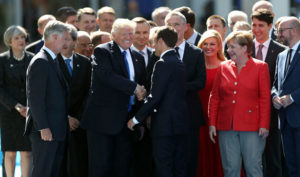Special to WorldTribune.com
UNITED NATIONS — President Donald Trump has scolded some members of the Atlantic Alliance for not paying their “fair share” in defense spending.
Addressing the NATO Summit in Brussels, the American president followed in the footsteps of many of his predecessors in saying that some members of the North Atlantic Treaty Organization (NATO) are simply not pulling their weight in the collective defense organization.
“Members of the alliance must finally contribute their fair share and meet their financial obligations,” Trump told the heads of state, “Twenty-three of the 28 member nations are still not paying what they should be paying and what they are supposed to be paying for their defense. This is not fair to the people and taxpayers of the United States,” he admonished.

Trump’s call, while terse in tone, reflects the political Kabuki of past U.S. presidents including both Reagan and Obama who pressured, usually unsuccessfully, the European states to spend more on defense.
Members agree to spend 2 percent of GDP on their military. Few do, except for the U.S. (3.6 percent), the United Kingdom, Greece, Estonia and Poland. Other major countries such as France, (1.8 percent), Germany (1.2 percent), and Canada (1 percent) fall far below.
Founded in the early days of the Cold War in 1949 with an initial twelve members, NATO remained an effective defensive deterrent to keep Western Europe free of probing Soviet aggression over a forty-year period.
The epoch historical events of 1989 which saw the fall of the Berlin Wall and the collapse of communism in Eastern Europe proved a political watershed not only in Europe’s reunification but as importantly, NATO’s new mission. Today the multinational organization has 28 members.
Some of NATO’s original East Bloc adversaries, such as Poland, Hungary and Bulgaria are now members. More problematic, especially to Russia, are the memberships of the three Baltic states, which were part of the former Soviet Union. Equally countries from former Yugoslavia, such as Croatia and Slovenia have joined the alliance.
The mission moreover has dramatically shifted in recent years from a pure Central European defense focus, and now hosts a number of our area commitments such as Afghanistan, Kosovo and anti-piracy patrols off East Africa.
Part of NATO 2.0 regards revamping the ongoing multinational mission in Afghanistan where American and troops from twenty NATO members are still facing an entrenched and expanding Taliban insurgency.
NATO Secretary General Jens Stoltenberg summed it up; “We face the most difficult security challenges for a generation. Terrorism, instability, a more assertive Russia, proliferation of nuclear weapons and the growth threat of cyber attacks.”
While NATO members signed on to President Trump’s commitment to fight Islamic State in Syria and Iraq, much of the support appears to be aspirational rather than operational. In other words, the fine rhetoric of a Brussels Summit may not be followed by practical military measures on the ground.
At the opening of NATO’s gleaming new headquarters in Brussels, President Trump, paid heartfelt homage to British Prime Minister Theresa May for the terrible terrorist attack in Manchester. He equally honored memorials to the Berlin Wall and to the Article 5 Collective Security Clause of the NATO Treaty-namely where all members come to the defense of any member attacked.
Trump stated, “We remember and mourn those nearly 3,000 innocent people who were brutally murdered by terrorists on September 11th, 2001. Our NATO allies responded swiftly and decisively, invoking for the first time in its history the Article 5 collective defense commitments.”
Significantly he stressed, “The NATO of the future must include a great focus on terrorism and immigration, as well as threats from Russia and on NATO’s eastern and southern borders.”
While NATO has been traditionally viewed through the lens of policymakers, there’s still a surprising support for the Alliance among the public.
A recent PEW survey stated Views of the North Atlantic Treaty Organization (NATO) have generally improved over the past year in both North America and Europe. According to PEW about 6 in ten Americans hold a favorable opinion of the security Alliance up from half in 2016. Majorities in Germany (67 percent), the Netherlands and Poland (both 79 percent) equally back the Alliance.
The survey adds, “But despite such swings in how NATO has been characterized by the current U.S. administration, most Europeans remain confident that Washington is committed to the principle of mutual defense,” the poll ascertained.
NATO remains a defense cornerstone of the valued Transatlantic relationship. America’s political trust and commitment forms the other.
John J. Metzler is a United Nations correspondent covering diplomatic and defense issues. He is the author of Divided Dynamism the Diplomacy of Separated Nations: Germany, Korea, China (2014). [See pre-2011 Archives]

